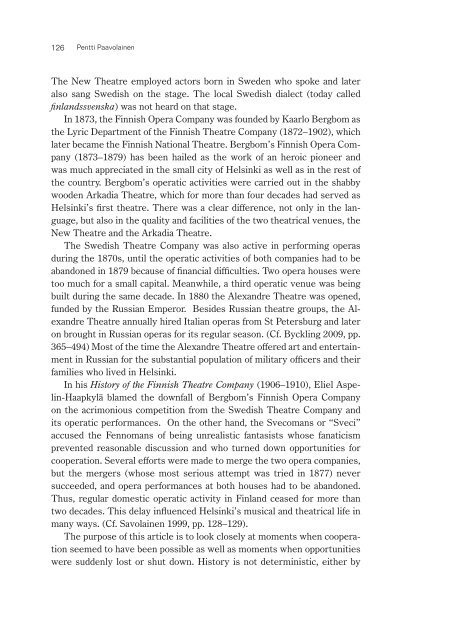Opera on the Move in the Nordic Countries during the Long 19th ...
Opera on the Move in the Nordic Countries during the Long 19th ...
Opera on the Move in the Nordic Countries during the Long 19th ...
Create successful ePaper yourself
Turn your PDF publications into a flip-book with our unique Google optimized e-Paper software.
126 Pentti Paavola<strong>in</strong>en<br />
The New Theatre employed actors born <strong>in</strong> Sweden who spoke and later<br />
also sang Swedish <strong>on</strong> <strong>the</strong> stage. The local Swedish dialect (today called<br />
f<strong>in</strong>landssvenska) was not heard <strong>on</strong> that stage.<br />
In 1873, <strong>the</strong> F<strong>in</strong>nish <str<strong>on</strong>g>Opera</str<strong>on</strong>g> Company was founded by Kaarlo Bergbom as<br />
<strong>the</strong> Lyric Department of <strong>the</strong> F<strong>in</strong>nish Theatre Company (1872–1902), which<br />
later became <strong>the</strong> F<strong>in</strong>nish Nati<strong>on</strong>al Theatre. Bergbom’s F<strong>in</strong>nish <str<strong>on</strong>g>Opera</str<strong>on</strong>g> Company<br />
(1873–1879) has been hailed as <strong>the</strong> work of an heroic pi<strong>on</strong>eer and<br />
was much appreciated <strong>in</strong> <strong>the</strong> small city of Hels<strong>in</strong>ki as well as <strong>in</strong> <strong>the</strong> rest of<br />
<strong>the</strong> country. Bergbom’s operatic activities were carried out <strong>in</strong> <strong>the</strong> shabby<br />
wooden Arkadia Theatre, which for more than four decades had served as<br />
Hels<strong>in</strong>ki’s first <strong>the</strong>atre. There was a clear difference, not <strong>on</strong>ly <strong>in</strong> <strong>the</strong> language,<br />
but also <strong>in</strong> <strong>the</strong> quality and facilities of <strong>the</strong> two <strong>the</strong>atrical venues, <strong>the</strong><br />
New Theatre and <strong>the</strong> Arkadia Theatre.<br />
The Swedish Theatre Company was also active <strong>in</strong> perform<strong>in</strong>g operas<br />
dur<strong>in</strong>g <strong>the</strong> 1870s, until <strong>the</strong> operatic activities of both companies had to be<br />
aband<strong>on</strong>ed <strong>in</strong> 1879 because of f<strong>in</strong>ancial difficulties. Two opera houses were<br />
too much for a small capital. Meanwhile, a third operatic venue was be<strong>in</strong>g<br />
built dur<strong>in</strong>g <strong>the</strong> same decade. In 1880 <strong>the</strong> Alexandre Theatre was opened,<br />
funded by <strong>the</strong> Russian Emperor. Besides Russian <strong>the</strong>atre groups, <strong>the</strong> Alexandre<br />
Theatre annually hired Italian operas from St Petersburg and later<br />
<strong>on</strong> brought <strong>in</strong> Russian operas for its regular seas<strong>on</strong>. (Cf. Byckl<strong>in</strong>g 2009, pp.<br />
365–494) Most of <strong>the</strong> time <strong>the</strong> Alexandre Theatre offered art and enterta<strong>in</strong>ment<br />
<strong>in</strong> Russian for <strong>the</strong> substantial populati<strong>on</strong> of military officers and <strong>the</strong>ir<br />
families who lived <strong>in</strong> Hels<strong>in</strong>ki.<br />
In his History of <strong>the</strong> F<strong>in</strong>nish Theatre Company (1906–1910), Eliel Aspel<strong>in</strong>-Haapkylä<br />
blamed <strong>the</strong> downfall of Bergbom’s F<strong>in</strong>nish <str<strong>on</strong>g>Opera</str<strong>on</strong>g> Company<br />
<strong>on</strong> <strong>the</strong> acrim<strong>on</strong>ious competiti<strong>on</strong> from <strong>the</strong> Swedish Theatre Company and<br />
its operatic performances. On <strong>the</strong> o<strong>the</strong>r hand, <strong>the</strong> Svecomans or “Sveci”<br />
accused <strong>the</strong> Fennomans of be<strong>in</strong>g unrealistic fantasists whose fanaticism<br />
prevented reas<strong>on</strong>able discussi<strong>on</strong> and who turned down opportunities for<br />
cooperati<strong>on</strong>. Several efforts were made to merge <strong>the</strong> two opera companies,<br />
but <strong>the</strong> mergers (whose most serious attempt was tried <strong>in</strong> 1877) never<br />
succeeded, and opera performances at both houses had to be aband<strong>on</strong>ed.<br />
Thus, regular domestic operatic activity <strong>in</strong> F<strong>in</strong>land ceased for more than<br />
two decades. This delay <strong>in</strong>fluenced Hels<strong>in</strong>ki’s musical and <strong>the</strong>atrical life <strong>in</strong><br />
many ways. (Cf. Savola<strong>in</strong>en 1999, pp. 128–129).<br />
The purpose of this article is to look closely at moments when cooperati<strong>on</strong><br />
seemed to have been possible as well as moments when opportunities<br />
were suddenly lost or shut down. History is not determ<strong>in</strong>istic, ei<strong>the</strong>r by
















